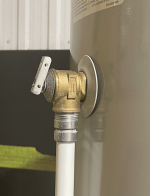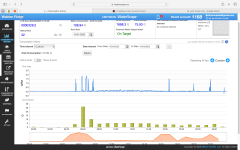We are struggling to identify a leak in our hot water system. This issue started on Feb 25 when our water utility installed a new Metron electronic meter on our service. Leak is between 20 and 70 gallons per day with lower leak rates at night?? Leak rates as high as 5 gallons per hour between 8am and 5pm. Our water usage has doubled with this 'new' leak. Water utility has replaced the meter three times. So far 3 plumbers and one thorough home inspector visit have found only 1 small leak in our 3/4" copper lines that was repaired. Crawl space allows easy and complete access to all service lines under the house and is semi enclosed showing any water leakage on that membrane. Thermal imaging indicates no water buildup in walls. We isolated toilets, washer, dishwasher, sinks and service line from the street. When we turn off the valve before the hot water heater(gas installed in 2023), the leak stops.Turning off the water heater does not stop the leak as we tested thermal expansion as a possible reason for the leak. No unusual connections such as irrigation system or water softener. We utilized a remote camera to search behind shower walls, and dishwasher to no avail. Used a stethoscope to try to identify water flow.
Leak is not constant but more of a cyclical wave pattern.
We are tracking our usage daily after measuring gallons used in shower and toilets. We were gone from the house one day this week and used some 50 gallons during that 9 hour period.
We are very frustrated and at a loss on what to do to identify the leak. Any suggestions on what we can do?
Leak is not constant but more of a cyclical wave pattern.
We are tracking our usage daily after measuring gallons used in shower and toilets. We were gone from the house one day this week and used some 50 gallons during that 9 hour period.
We are very frustrated and at a loss on what to do to identify the leak. Any suggestions on what we can do?


